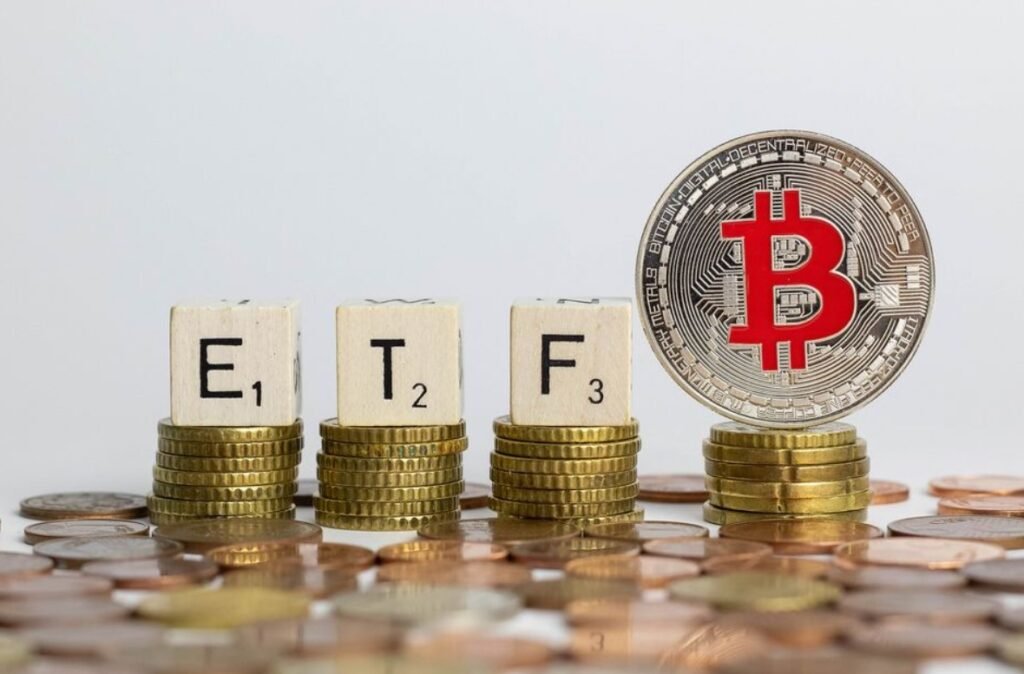Grayscale Investments, the largest digital asset manager in the world, has refiled its application to convert its flagship Grayscale Bitcoin Trust (GBTC) into a Bitcoin exchange-traded fund (ETF) backed by physical Bitcoin. The move comes on the same day that Barry Silbert, the founder and CEO of Digital Currency Group (DCG), Grayscale’s parent company, announced his departure from the firm’s board of directors.
Grayscale has been operating GBTC since 2013, offering investors exposure to Bitcoin without having to buy or store the cryptocurrency themselves. GBTC is currently the largest publicly traded Bitcoin fund, with over $38 billion in assets under management as of October 15, 2023.

However, GBTC has some drawbacks, such as a six-month lock-up period for new investors, a 2% annual management fee, and a persistent discount to the net asset value (NAV) of Bitcoin. This means that GBTC shares trade at a lower price than the value of the underlying Bitcoin. At press time, the GBTC discount is 15.15%.
Grayscale has been seeking to convert GBTC into a Bitcoin ETF, which would eliminate these issues and make the fund more attractive and accessible to investors. A Bitcoin ETF would track the price of Bitcoin directly, charge lower fees, and trade on major stock exchanges.
Grayscale first filed for a Bitcoin ETF in 2016, but withdrew its application in 2017, citing regulatory uncertainty. In April 2023, Grayscale announced its intention to refile for a Bitcoin ETF, saying that it was “100% committed” to the conversion.
SEC’s Resistance and Court’s Ruling
Grayscale’s Bitcoin ETF application faced strong resistance from the U.S. Securities and Exchange Commission (SEC), which has been reluctant to approve any Bitcoin ETFs in the past. The SEC cited concerns about the lack of regulation, transparency, and liquidity in the Bitcoin market, as well as the potential for fraud and manipulation.
In August 2023, the SEC rejected Grayscale’s application, saying that it did not meet the standards for an ETF under the Securities Exchange Act of 1934. Grayscale challenged the SEC’s decision in court, arguing that the agency was “arbitrary and capricious” and that it ignored the evidence and arguments presented by Grayscale.
In October 2023, the D.C. Circuit Court of Appeals ruled in favor of Grayscale, saying that the SEC failed to provide a reasoned explanation for its rejection and that it did not adequately consider the benefits of a Bitcoin ETF for investors and the market. The court ordered the SEC to reconsider Grayscale’s application and to give it a fair and thorough review.
The SEC did not appeal the court’s ruling, which became final on October 23, 2023. This means that the SEC has to re-evaluate Grayscale’s application and either approve it or reject it on other grounds. The SEC is also reviewing several other Bitcoin ETF applications from various firms, including BlackRock, Fidelity, and Franklin Templeton.
Barry Silbert’s Departure
On the same day that Grayscale refiled its Bitcoin ETF application, Barry Silbert, the founder and CEO of DCG, announced that he was stepping down from the firm’s board of directors. Silbert said that he would remain as the CEO of DCG, but that he wanted to focus more on his personal investments and philanthropic activities.
Silbert is one of the most influential and successful figures in the crypto industry, having founded DCG in 2015 as a holding company for various crypto-related businesses, including Grayscale, CoinDesk, Genesis, and Foundry. DCG has invested in over 200 crypto companies and projects, and has significant holdings of digital assets, including Bitcoin.
Silbert said that he was proud of what DCG and Grayscale have achieved, and that he was confident in the future of the crypto industry. He also expressed his support for Grayscale’s Bitcoin ETF efforts, saying that he believed that it was “inevitable” that the SEC would approve a Bitcoin ETF in the U.S.
Implications for the Crypto Market
Grayscale’s refiled Bitcoin ETF application and Barry Silbert’s departure are two major events that could have significant implications for the crypto market. Grayscale’s Bitcoin ETF, if approved, could boost the demand and adoption of Bitcoin, as well as the price and liquidity of the cryptocurrency. It could also pave the way for more Bitcoin ETFs and other crypto-related products in the U.S.
Barry Silbert’s departure, on the other hand, could signal a shift in the leadership and vision of DCG and Grayscale, as well as the crypto industry as a whole. Silbert has been a pioneer and a visionary in the crypto space, and his influence and expertise will be missed. However, he also said that he would continue to be involved in the crypto industry, and that he would support the growth and innovation of DCG and Grayscale.
The crypto market has been reacting positively to these developments, with Bitcoin reaching a new all-time high of over $66,000 on October 24, 2023. The market sentiment is optimistic and bullish, as investors anticipate the approval of a Bitcoin ETF in the U.S. and the expansion of the crypto ecosystem.
